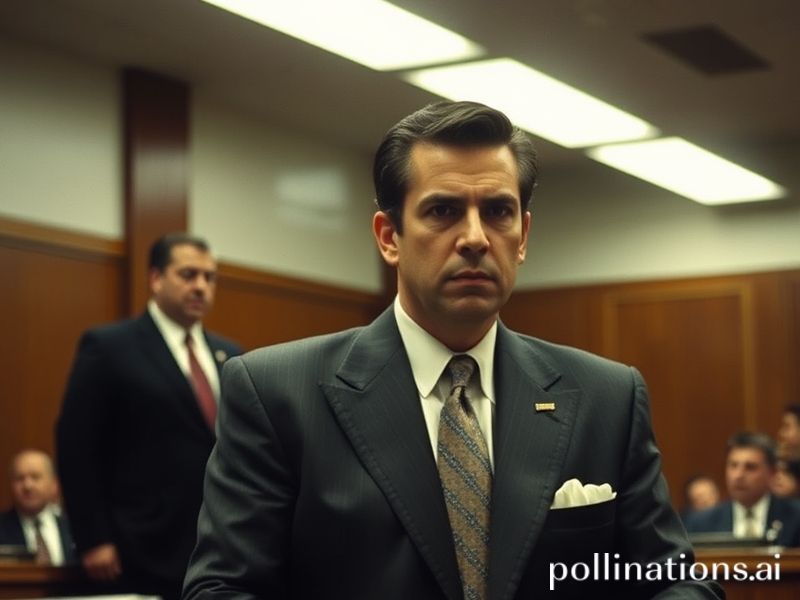The Armenian-American Lawyer Who Accidentally Invented Global Influencer Culture
**The Man Who Invented Modern Fame, One Acquittal at a Time**
*How a modest Armenian-American lawyer accidentally blueprinted the global attention economy we now inhabit*
PARIS—Long before TikTok teenagers monetized their breakfast choices, before Instagram influencers turned existential dread into sponsored content, before reality television metastasized into a $100 billion global industry, there was Robert Kardashian: a soft-spoken attorney who quietly pioneered the business model that would eventually eat civilization alive.
The international press, ever vigilant for American absurdities they can judge while secretly envying, has largely missed the joke. Kardashian wasn’t merely O.J. Simpson’s loyal friend and defense team member—he was Patient Zero in a pandemic of manufactured celebrity that would spread from Calabasas to Kolkata, transforming human attention into the world’s most volatile currency.
Consider the mathematics: When Kardashian stood beside Simpson in 1994, global television audiences peaked at 150 million viewers. Today, his daughters command 1.5 billion social media followers collectively, generating more annual GDP than Iceland. Somewhere in hell, P.T. Barnum is taking notes and wondering why he bothered with actual circuses.
The genius lay not in seeking fame directly—that would be vulgar—but in understanding that proximity to notoriety could be reverse-engineered into influence. Kardashian’s post-trial pivot was masterful: leverage legal gravitas into business relationships, transform family connections into social capital, and wait patiently while technology caught up to the business model. By the time Instagram launched in 2010, the apparatus was perfectly positioned to scale globally.
The international implications have been staggering. From Seoul to São Paulo, the Kardashian playbook—famous for being adjacent to famous, wealthy for being watched—has become the dominant export of American soft power. Chinese influencers now build empires on Weibo using identical algorithms of curated intimacy. European aristocrats, those vestigial relics of actual achievement, monetize their bloodlines through Kardashian-style reality programming. Even North Korea’s propaganda machine has adopted the aesthetic, though their filters are considerably less forgiving.
What makes this particularly dark comedy is how Kardashian himself would have hated it all. Friends describe him as a traditionalist who valued privacy, education, and hard work—concepts his progeny have systematically devalued while building their digital fiefdoms. He died in 2003, just as the internet was beginning its transformation into history’s most sophisticated attention-harvesting machine. One suspects his ghost watches the current circus with the expression of a man who invented dynamite and lived just long enough to see the first explosion.
The global economy now runs on a simple equation: attention equals influence equals money. From Mumbai’s slums to Manhattan’s penthouses, teenagers dream not of curing cancer or exploring space, but of achieving “Kardashian numbers”—a metric that reduces human potential to follower counts and engagement rates. The UN estimates that by 2030, the global influencer economy will exceed $500 billion, making it larger than the GDP of South Africa. All built on the foundation of one man’s willingness to stand beside a friend during the trial of the century.
Robert Kardashian’s true legacy isn’t legal or even cultural—it’s ontological. He demonstrated that in the modern economy, being becomes indistinguishable from being perceived. The philosophical implications would make Descartes weep: “I am watched, therefore I am.”
As nations scramble to regulate social media, to tax digital influence, to protect citizens from the psychological warfare of algorithmic feeds, they’re essentially trying to close Pandora’s Box after the family has already monetized the contents. The international community can ban TikTok, break up Meta, or force Kardashian-style disclosures on sponsored content, but they’re treating symptoms, not the disease.
The disease, of course, is human nature itself—our primitive brains never evolved to distinguish between genuine achievement and the mere simulation of it. Robert Kardashian didn’t exploit this bug in our operating system; he simply discovered it first and built a dynasty on the glitch.
In the end, perhaps that’s the darkest joke of all. A man who spent his career defending the accused inadvertently pioneered the perfect crime: stealing human attention on a global scale, one perfectly filtered moment at a time.







